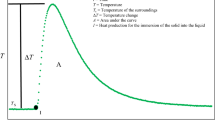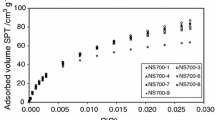Abstract
Three samples of activated carbon of wood origin with various amounts of surface functional groups and different porous structure were used as adsorbents of water, methanol, and diethyl ether. Then the isotherms at three different temperatures were used to calculate distributions of adsorption potential, free energy of adsorption and adsorption energy. The results showed that the strength of interactions depends on both the porosity of the sample and its surface chemistry. The effect of surface chemistry is the most important in the case of water and the least important in the case of diethyl ether. The high-energy centers are related to adsorption in narrow pores containing functional groups. For molecules consisting of hydrocarbon moiety and oxygen containing groups (methanol and diethyl ether) the surface chemistry plays a role at low surface coverage.
Similar content being viewed by others
References
Adamson, A.W. and A.P. Gast, Physical Chemistry of Surface, 6th ed., Wiley, New York, 1997.
Bagreev, A., S. Bashkova, and T.J. Bandosz, Langmuir, 18, 8553 (2002).
Boehm, H.P., Carbon, 32, 759 (1994).
Dubinin, M.M., Carbon 18, 355(1980).
Jaroniec, M. and R. Madey, Physical Adsorption on Heterogeneous Solids., Elsevier, Amsterdam, 1988.
Kruk, M., M. Jaroniec, and K.P., Gadkaree, Langmuir, 15, 1442 (1999).
Lastoskie, C.M., K.E. Gubbins, and N. Quirke, J. Phys. Chem., 97, 4786 (1993).
Leon y Leon, C.A. and L.R. Radovic, In Chemistry and Physics of Carbon, P.A. Thrower (Ed.), Vol. 24, pp. 213. M. Dekker, New York, 1992.
Platzer, B. and G. Maurer, Fluid Phase Equilibr., 51, 223–236 (1989).
Salame, I.I. and T.J. Bandosz, J. Phys. Chem., 36, 1433 (1999a).
Salame, I.I. and T.J. Bandosz, Langmuir, 15, 587 (1999b).
Salame, I.I. and T.J. Bandosz, Ind.Eng.Chem.Res., 39, 301 (2000).
Salame, I.I. and T.J. Bandosz, Langmuir, 17, 4967 (2001).
Author information
Authors and Affiliations
Corresponding author
Rights and permissions
About this article
Cite this article
Gun’Ko, V. Heterogeneity of Adsorption Energy of Water, Methanol and Diethyl Ether on Activated Carbons. Adsorption 11 (Suppl 1), 97–102 (2005). https://doi.org/10.1007/s10450-005-5905-8
Issue Date:
DOI: https://doi.org/10.1007/s10450-005-5905-8




